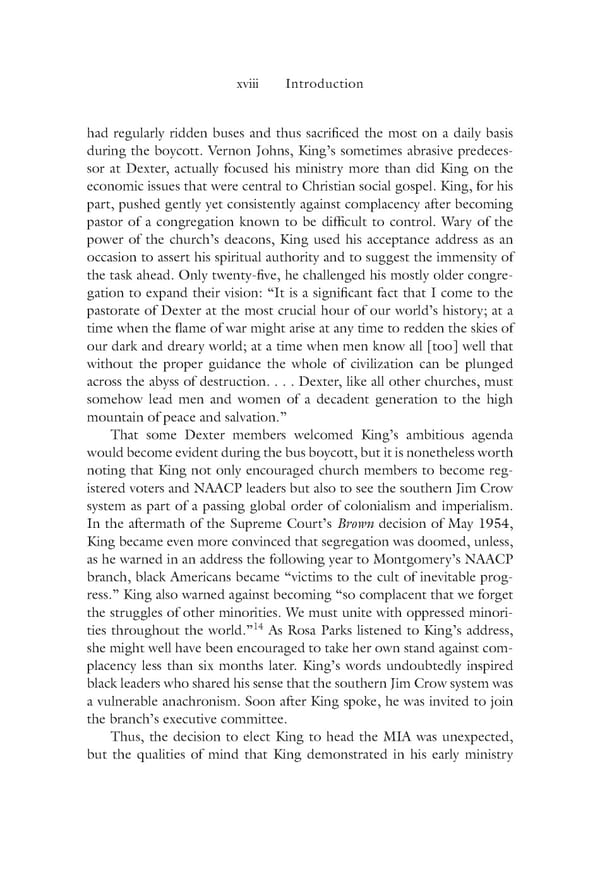xviii Introduction had regularly ridden buses and thus sacrificed the most on a daily basis during the boycott. Vernon Johns, King’s sometimes abrasive predeces- sor at Dexter, actually focused his ministry more than did King on the economic issues that were central to Christian social gospel. King, for his part, pushed gently yet consistently against complacency after becoming pastor of a congregation known to be difficult to control. Wary of the power of the church’s deacons, King used his acceptance address as an occasion to assert his spiritual authority and to suggest the immensity of the task ahead. Only twenty-five, he challenged his mostly older congre- gation to expand their vision: “It is a significant fact that I come to the pastorate of Dexter at the most crucial hour of our world’s history; at a time when the flame of war might arise at any time to redden the skies of our dark and dreary world; at a time when men know all [too] well that without the proper guidance the whole of civilization can be plunged across the abyss of destruction. . . . Dexter, like all other churches, must somehow lead men and women of a decadent generation to the high mountain of peace and salvation.” That some Dexter members welcomed King’s ambitious agenda would become evident during the bus boycott, but it is nonetheless worth noting that King not only encouraged church members to become reg- istered voters and NAACP leaders but also to see the southern Jim Crow system as part of a passing global order of colonialism and imperialism. In the aftermath of the Supreme Court’s Brown decision of May 1954, King became even more convinced that segregation was doomed, unless, as he warned in an address the following year to Montgomery’s NAACP branch, black Americans became “victims to the cult of inevitable prog- ress.” King also warned against becoming “so complacent that we forget the struggles of other minorities. We must unite with oppressed minori- ties throughout the world.”14 As Rosa Parks listened to King’s address, she might well have been encouraged to take her own stand against com- placency less than six months later. King’s words undoubtedly inspired black leaders who shared his sense that the southern Jim Crow system was a vulnerable anachronism. Soon after King spoke, he was invited to join the branch’s executive committee. Thus, the decision to elect King to head the MIA was unexpected, but the qualities of mind that King demonstrated in his early ministry
 Becoming King: Martin Luther King Jr. Page 18 Page 20
Becoming King: Martin Luther King Jr. Page 18 Page 20